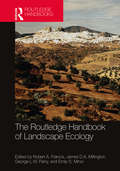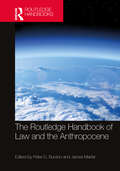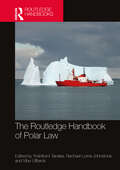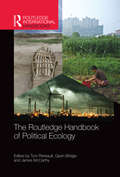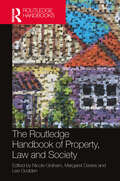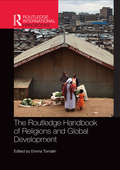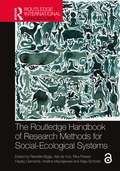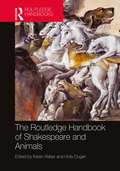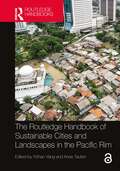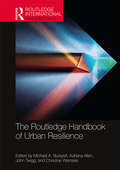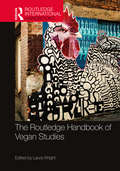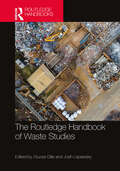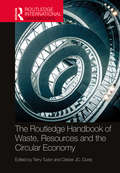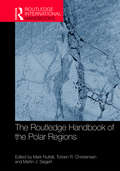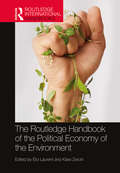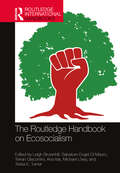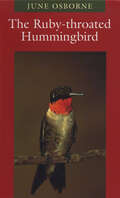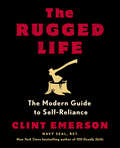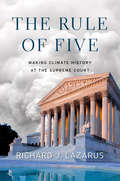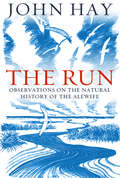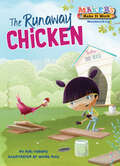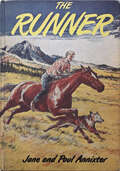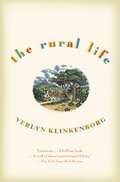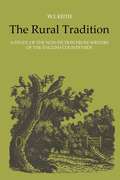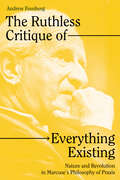- Table View
- List View
The Routledge Handbook of Landscape Ecology
by Robert A. Francis, James D.A. Millington, George L.W. Perry, and Emily S. MinorThe Handbook provides a supporting guide to key aspects and applications of landscape ecology to underpin its research and teaching. A wide range of contributions written by expert researchers in the field summarize the latest knowledge on landscape ecology theory and concepts, landscape processes, methods and tools, and emerging frontiers. Landscape ecology is an interdisciplinary and holistic discipline, and this is reflected in the chapters contained in this Handbook. Authors from varying disciplinary backgrounds tackle key concepts such as landscape structure and function, scale and connectivity; landscape processes such as disturbance, flows, and fragmentation; methods such as remote sensing and mapping, fieldwork, pattern analysis, modelling, and participation and engagement in landscape planning; and emerging frontiers such as ecosystem services, landscape approaches to biodiversity conservation, and climate change. Each chapter provides a blend of the latest scientific understanding of its focal topics along with considerations and examples of their application from around the world. An invaluable guide to the concepts, methods, and applications of landscape ecology, this book will be an important reference text for a wide range of students and academics in ecology, geography, biology, and interdisciplinary environmental studies.
The Routledge Handbook of Law and the Anthropocene
by Peter D. Burdon and James MartelThe Routledge Handbook of Law and the Anthropocene provides a critical survey into the function of law and governance during a time when humans have the power to impact the Earth system. The Anthropocene is a “crisis of the earth system.” This book addresses its implications for law and legal thinking in the twenty-first century. Unpacking the challenges of the Anthropocene for advocates of ecological law and politics, this handbook pursues a range of approaches to the scientific fact of anthropocentrism, with contributions from lawyers, philosophers, geographers, and environmental and political scientists. Rather than adopting a hubristic normativity, the contributors engage methods, concepts, and legal instruments in a way that underscores the importance of humility and an expansive ethical worldview. Contributors to this volume are leading scholars and future leaders in the field. Rather than upholding orthodoxy, the handbook also problematizes received wisdom and is grounded in the conviction that the ideas we have inherited from the Holocene must all be open to question. Engaging such issues as the Capitalocene, Gaia theory, the rights of nature, posthumanism, the commons, geoengineering, and civil disobedience, this handbook will be of enormous interest to academics, students, and others with interests in ecological law and the current environmental crisis.
The Routledge Handbook of Polar Law (Routledge Handbooks in Law)
by Yoshifumi Tanaka Vibe Ulfbeck Rachael Lorna JohnstonePolar law describes the normative frameworks that govern the relationships between humans, States, Peoples, institutions, land and resources in the Arctic and the Antarctic. These two regions are superficially similar in terms of natural environmental conditions but the overarching frameworks that apply are fundamentally different. The Routledge Handbook of Polar Law explores the legal orders in the Arctic and Antarctic in a comparative perspective, identifying similarities as well as differences. It points to a distinct discipline of "Polar law" as the body of rules governing actors, spaces and institutions at the Poles. Four main features define the collection: the Arctic-Antarctic interface; the interaction between global, regional and domestic legal regimes; the rights of Indigenous Peoples; and the increasing importance of private law. While these broad themes have been addressed to varying extents elsewhere, the editors believe that this Handbook brings them together to create a comprehensive (if never exhaustive) account of what constitutes Polar law today. Leading scholars in public international and private law as well as experts in related fields come together to offer unique insights into polar law as a burgeoning discipline.
The Routledge Handbook of Political Ecology (Routledge International Handbooks)
by Gavin Bridge Tom Perreault James McCarthyThe Routledge Handbook of Political Ecology presents a comprehensive and authoritative examination of the rapidly growing field of political ecology. Located at the intersection of geography, anthropology, sociology, and environmental history, political ecology is one of the most vibrant and conceptually diverse fields of inquiry into nature-society relations within the social sciences. The Handbook serves as an essential guide to this rapidly evolving intellectual landscape. With contributions from over 50 leading authors, the Handbook presents a systematic overview of political ecology’s origins, practices and core concerns, and aims to advance both ongoing and emerging debates. While there are numerous edited volumes, textbooks, and monographs under the heading ‘political ecology,’ these have tended to be relatively narrow in scope, either as collections of empirically based (mostly case study) research on a given theme, or broad overviews of the field aimed at undergraduate audiences. The Routledge Handbook of Political Ecology is the first systematic, comprehensive overview of the field. With authors from North and South America, Europe, Australia and elsewhere, the Handbook of Political Ecology provides a state of the art examination of political ecology; addresses ongoing and emerging debates in this rapidly evolving field; and charts new agendas for research, policy, and activism. The Routledge Handbook of Political Ecology introduces political ecology as an interdisciplinary academic field. By presenting a ‘state of the art’ examination of the field, it will serve as an invaluable resource for students and scholars. It not only critically reviews the key debates in the field, but develops them. The Handbook will serve as an excellent resource for graduate and advanced undergraduate teaching, and is a key reference text for geographers, anthropologists, sociologists, environmental historians, and others working in and around political ecology.
The Routledge Handbook of Property, Law and Society
by Nicole Graham, Margaret Davies and Lee GoddenThis handbook brings together diverse perspectives, major topics, and multiple approaches to one of the biggest legal institutions in society: property. Property touches on many fundamental human questions. It involves decisions about power, economy, morality, work, and ecology. It also involves ideas about where humans fit in the world and how humans relate to more-than-human life. This book will ask in myriad ways such questions as: what property means, what kinds of property there are, what is and should be the relationship between owned and owner, and what is the impact of different forms of property on life in this world? Drawing on a range of socio-legal and empirical methodologies, renowned scholars and rising stars in property from around the world present current issues and map future directions in research. Coming from the place of law but reaching out through cognate disciplines, this handbook provides a comprehensive and accessible survey of current research at the interface of property, society, and the environment. This handbook will appeal to students and researchers across a range of disciplines, including law, sociology, geography, history, and economics.
The Routledge Handbook of Religions and Global Development (Routledge International Handbooks)
by Emma TomalinThis Handbook provides a cutting-edge survey of the state of research on religions and global development. Part one highlights critical debates that have emerged within research on religions and development, particularly with respect to theoretical, conceptual and methodological considerations, from the perspective of development studies and its associated disciplines. Parts two to six look at different regional and national development contexts and the place of religion within these. These parts integrate and examine the critical debates raised in part one within empirical case studies from a range of religions and regions. Different religions are situated within actual locations and case studies thus allowing a detailed and contextual understanding of their relationships to development to emerge. Part seven examines the links between some important areas within development policy and practice where religion is now being considered, including: Faith-Based Organisations and Development Public Health, Religion and Development Human rights, Religion and Development Sustainable Development, Climate Change and Religion Global Institutions and Religious Engagement in Development Economic Development and Religion Religion, Development and Fragile States Development and Faith-Based Education Taking a global approach, the Handbook covers Africa, Latin America, South Asia, East and South-East Asia, and the Middle East. It is essential reading for students and researchers in development studies and religious studies, and is highly relevant to those working in area studies, as well as a range of disciplines, from theology, anthropology and economics to geography, international relations, politics and sociology.
The Routledge Handbook of Research Methods for Social-Ecological Systems (Routledge International Handbooks)
by Rika Preiser Reinette Biggs Maja Schlüter Alta De Vos Hayley Clements Kristine MaciejewskiThe Routledge Handbook of Research Methods for Social-Ecological Systems provides a synthetic guide to the range of methods that can be employed in social-ecological systems (SES) research. The book is primarily targeted at graduate students, lecturers and researchers working on SES, and has been written in a style that is accessible to readers entering the field from a variety of different disciplinary backgrounds. Each chapter discusses the types of SES questions to which the particular methods are suited and the potential resources and skills required for their implementation, and provides practical examples of the application of the methods. In addition, the book contains a conceptual and practical introduction to SES research, a discussion of key gaps and frontiers in SES research methods, and a glossary of key terms in SES research. Contributions from 97 different authors, situated at SES research hubs in 16 countries around the world, including South Africa, Sweden, Germany and Australia, bring a wealth of expertise and experience to this book. The first book to provide a guide and introduction specifically focused on methods for studying SES, this book will be of great interest to students and scholars of sustainability science, environmental management, global environmental change studies and environmental governance. The book will also be of interest to upper-level undergraduates and professionals working at the science–policy interface in the environmental arena.
The Routledge Handbook of Shakespeare and Animals (Routledge Literature Handbooks)
by Karen Raber and Holly DuganShakespeare’s plays have a long and varied performance history. The relevance of his plays in literary studies cannot be understated, but only recently have scholars been looking into the presence and significance of animals within the canon. Readers will quickly find—without having to do extensive research—that the plays are teeming with animals! In this Handbook, Karen Raber and Holly Dugan delve deep into Shakespeare’s World to illuminate and understand the use of animals in his span of work. This volume supplies a valuable resource, offering a broad and thorough grounding in the many ways animal references and the appearance of actual animals in the plays can be interpreted. It provides a thorough overview; demonstrates rigorous, original research; and charts new frontiers in the field through a broad variety of contributions from an international group of well-known and respected scholars.
The Routledge Handbook of Sustainable Cities and Landscapes in the Pacific Rim (Routledge Environment and Sustainability Handbooks)
by Yizhao YangThis handbook addresses a growing list of challenges faced by regions and cities in the Pacific Rim, drawing connections around the what, why, and how questions that are fundamental to sustainable development policies and planning practices. These include the connection between cities and surrounding landscapes, across different boundaries and scales; the persistence of environmental and development inequities; and the growing impacts of global climate change, including how physical conditions and social implications are being anticipated and addressed. Building upon localized knowledge and contextualized experiences, this edited collection brings attention to place-based approaches across the Pacific Rim and makes an important contribution to the scholarly and practical understanding of sustainable urban development models that have mostly emerged out of the Western experiences. Nine sections, each grounded in research, dialogue, and collaboration with practical examples and analysis, focus on a theme or dimension that carries critical impacts on a holistic vision of city-landscape development, such as resilient communities, ecosystem services and biodiversity, energy, water, health, and planning and engagement. This international edited collection will appeal to academics and students engaged in research involving landscape architecture, architecture, planning, public policy, law, urban studies, geography, environmental science, and area studies. It also informs policy makers, professionals, and advocates of actionable knowledge and adoptable ideas by connecting those issues with the Sustainable Development Goals (SDGs) of the United Nations. The collection of writings presented in this book speaks to multiyear collaboration of scholars through the APRU Sustainable Cities and Landscapes (SCL) Program and its global network, facilitated by SCL Annual Conferences and involving more than 100 contributors from more than 30 institutions.
The Routledge Handbook of Urban Resilience (Routledge International Handbooks)
by Adriana Allen Christine Wamsler Michael A. Burayidi John TwiggThis volume provides a comprehensive discussion and overview of urban resilience, including socio-ecological and economic hazard and disaster resilience. It provides a summary of state of the art thinking on resilience, the different approaches, tools and methodologies for understanding the subject in urban contexts, and brings together related reflections and initiatives. Throughout the different chapters, the handbook critically examines and reviews the resilience concept from various disciplinary and professional perspectives. It also discusses major urban crises, past and recent, and the generic lessons they provide for resilience. In this context, the authors provide case studies from different places and times, including historical material and contemporary examples, and studies that offer concrete guidance on how to approach urban resilience. Other chapters focus on how current understanding of urban systems – such as shrinking cities, green infrastructure, disaster volunteerism, and urban energy systems – are affecting the capacity of urban citizens, settlements and nation-states to respond to different forms and levels of stressors and shocks. The handbook concludes with a synthesis of the state of the art knowledge on resilience and points the way forward in refining the conceptualization and application of urban resilience. The book is intended for scholars and graduate students in urban studies, environmental and sustainability studies, geography, planning, architecture, urban design, political science and sociology, for whom it will provide an invaluable and up-to-date guide to current approaches across these disciplines that converge in the study of urban resilience. The book also provides important direction to practitioners and civic leaders who are engaged in supporting cities and regions to position themselves for resilience in the face of climate change, unpredictable socioenvironmental shocks and incremental risk accumulation.
The Routledge Handbook of Vegan Studies (Routledge International Handbooks)
by Laura WrightThis wide-ranging volume explores the tension between the dietary practice of veganism and the manifestation, construction, and representation of a vegan identity in today’s society. Emerging in the early 21st century, vegan studies is distinct from more familiar conceptions of "animal studies," an umbrella term for a three-pronged field that gained prominence in the late 1990s and early 2000s, consisting of critical animal studies, human animal studies, and posthumanism. While veganism is a consideration of these modes of inquiry, it is a decidedly different entity, an ethical delineator that for many scholars marks a complicated boundary between theoretical pursuit and lived experience. The Routledge Handbook of Vegan Studies is the must-have reference for the important topics, problems, and key debates in the subject area and is the first of its kind. Comprising over 30 chapters by a team of international contributors, this handbook is divided into five parts: History of vegan studies Vegan studies in the disciplines Theoretical intersections Contemporary media entanglements Veganism around the world These sections contextualize veganism beyond its status as a dietary choice, situating veganism within broader social, ethical, legal, theoretical, and artistic discourses. This book will be essential reading for students and researchers of vegan studies, animal studies, and environmental ethics.
The Routledge Handbook of Waste Studies (Routledge Environment and Sustainability Handbooks)
by Zsuzsa GilleThe Routledge Handbook of Waste Studies offers a comprehensive survey of the new field of waste studies, critically interrogating the cultural, social, economic and political systems within which waste is created, managed and circulated. While scholars have not settled on a definitive categorization of what waste studies is, more and more researchers claim that there is distinct cluster of inquiries, concepts, theories and key themes that constitute this field. In this handbook the editors and contributors explore the research questions, methods and case studies preoccupying academics working in this field, in an attempt to develop a set of criteria by which to define and understand waste studies as an interdisciplinary field of study. This handbook will be invaluable to those wishing to broaden their understanding of waste studies and to students and practitioners of geography, sociology, anthropology, history, environment and sustainability studies.
The Routledge Handbook of Waste, Resources and the Circular Economy (Routledge International Handbooks)
by Terry Tudor Cleber Jc. DutraThe Handbook introduces, contextualises, critiques, and discusses a range of perspectives associated with the concept of the circular economy. These perspectives span an array of subjects including economics, environmental policymaking, sociology, environmental science, environmental and industrial engineering, management, international development, and human geography. A fundamental underpinning of the Handbook is that it takes account of a wide range of sectors, as well as geographical perspectives that incorporate both a Global North and Global South world context. This approach is crucial because it is only within such a holistic perspective that the circular economy concept can truly be examined. In addition, these issues are examined both from a theoretical as well as a practical perspective, using real-world case studies for illustration. Given its wide subject, sectoral, and geographical areas of focus, the Handbook should be of value not only for those undertaking research in the field of circular economy, but also stakeholders involved in policymaking, as well as decision-making on the front line.
The Routledge Handbook of the Polar Regions (Routledge International Handbooks)
by Mark Nuttall Torben R Christensen Martin SiegertThe Routledge Handbook of the Polar Regions is an authoritative guide to the Arctic and the Antarctic through an exploration of key areas of research in the physical and natural sciences and the social sciences and humanities. It presents 38 new and original contributions from leading figures and voices in polar research, policy and practice, as well as work from emerging scholars. This handbook aims to approach and understand the Polar Regions as places that are at the forefront of global conversations about some of the most pressing contemporary issues and research questions of our age. The volume provides a discussion of the similarities and differences between the two regions to help deepen understanding and knowledge. Major themes and issues are integrated in the comprehensive introduction chapter by the editors, who are top researchers in their respective fields. The contributions show how polar researchers engage with contemporary debates and use interdisciplinary and multidisciplinary approaches to address new developments as well as map out exciting trajectories for future work in the Arctic and the Antarctic. The handbook provides an easy access to key items of scholarly literature and material otherwise inaccessible or scattered throughout a variety of specialist journals and books. A unique one-stop research resource for researchers and policymakers with an interest in the Arctic and Antarctic, it is also a comprehensive reference work for graduate and advanced undergraduate students.
The Routledge Handbook of the Political Economy of the Environment (Routledge International Handbooks)
by Éloi Laurent Klara ZwicklFeaturing a stellar international cast list of leading and cutting-edge scholars, The Routledge Handbook of the Political Economy of the Environment presents the state of the art of the discipline that considers ecological issues and crises from a political economy perspective. This collective volume sheds new light on the effect of economic and power inequality on environmental dynamics and, conversely, on the economic and social impact of environmental dynamics. The chapters gathered in this handbook make four original contributions to the field of political economy of the environment. First, they revisit essential concepts and methods of environmental economics in the light of their political economy. Second, they introduce readers to recent theoretical and empirical advances in key issues of political economy of the environment with a special focus on the relationship between inequality and environmental degradation, a nexus that has dramatically come into focus with the COVID crisis. Third, the authors of this handbook open the field to its critical global and regional dimensions: global issues, such as the environmental justice movement and inequality and climate change as well as regional issues such as agriculture systems, air pollution, natural resources appropriation and urban sustainability. Fourth and finally, the work shows how novel analysis can translate into new forms of public policy that require institutional reform and new policy tools. Ecosystems preservation, international climate negotiations and climate mitigation policies all have a strong distributional dimension that chapters point to. Pressing environmental policy such as carbon pricing and low-carbon and energy transitions entail numerous social issues that also need to be accounted for with new analytical and technological tools. This handbook will be an invaluable reference, research and teaching tool for anyone interested in political economy approaches to environmental issues and ecological crises.
The Routledge Handbook on Ecosocialism (Routledge International Handbooks)
by Michael Löwy Ana Isla Salvatore Engel-Di Mauro Leigh Brownhill Terran Giacomini Terisa E. TurnerBuilding on the classical works that have propelled and shaped ecosocialist thinking and action and more recent political developments on the ground, the volume will provide a reference point for international work in the field, both directly political and academic. The Handbook acquaints readers with the varied roots of and sometimes conflicting approaches to ecosocialism. It does not attempt any unification of ecosocialist currents. Rather, it aims to provide a resource that is as comprehensive as possible with respect not only to theorization and ideological framing, but also and especially to existing projects, practices, and movements and giving a sense of the geographical reach that ecosocialism so far represents. This includes scholarship that extends Marxist foundations and reflects on more recent political developments. The theoretical and practice-oriented moorings are buttressed by discussions on movements, frameworks, and prefigurative processes as well as on social struggles occurring within institutional settings. Together, the collection offers a reference point for international work in the field, in social movements, and in institutional transformations. Providing detailed but accessible overviews of the complex, varied dimensions of ecosocialism, the Handbook is an essential up-to-date guide and reference not only for researchers, but also for undergraduate and graduate students in geography, environmental studies, development studies, sociology, and political science, as well as for policymakers and activists.
The Ruby-throated Hummingbird (Corrie Herring Hooks Series)
by June OsborneIn this invitingly-written book, June Osborne paints a fully detailed portrait of perhaps the best-known hummingbird in the United States, the ruby-throat. There is no mistaking a hummingbird. Even people who hardly know a robin from a sparrow recognize that flash of iridescent feathers and the distinctive hovering flight. So popular have &“hummers&” become that even casual birdwatchers now travel great distances to hummingbird hot spots to see masses of birds in their annual migrations. Drawing from her own birdwatching experiences, June Osborne offers an &“up close and personal&” look at a female ruby-throat building her nest and rearing young, as well as an account of a day in the life of a male ruby-throat and stories of the hummers&’ migrations between their summer breeding grounds in the United States and Canada and their winter homes in Mexico and Central America. In addition to this life history, Osborne recounts early hummingbird sightings and tells how the bird received its common and scientific names. After an overview of hummingbirds&’ distinctive ways of feeding, flying, and conserving energy, she offers a detailed description of the ruby-throat that will help you tell females from males, immature birds from adults, and ruby-throats from similar species. Osborne also takes you on a visit to the &“Hummer/Bird Celebration!&” at Rockport, reviews hummingbird banding programs, and explains how to attract hummingbirds to your yard or apartment balcony.
The Rugged Life: The Modern Guide to Self-Reliance
by Clint EmersonBecome self-reliant, live off the land, and be prepared for the unexpected in this modern guide to self-sufficiency and homesteading from New York Times bestselling author, retired Navy SEAL, and survival skills expert Clint Emerson.&“Add The Rugged Life by former Navy SEAL Clint Emerson to your library today and get on the path to independence and self-sufficiency.&”—Jack Carr, Navy SEAL Sniper and #1 New York Times bestselling author of The Devil&’s HandClint Emerson is the go-to expert for surviving the first minutes, hours, and days of a crisis. Now, in The Rugged Life, he works with modern homesteading experts to show you how to thrive over the long-term—for months, years, or even a lifetime—by being prepared and self-sufficient. You can live the Rugged Life completely off-the-grid by farming your own food and using the waste from your toilet for compost. Or, you can live it by adding solar panels to your suburban home and keeping chickens and bees in your backyard. You can even live the Rugged Life in a city by simply gathering the salad for tonight&’s dinner from your windowsill garden. Each of these homesteading and prepper long-term survival skills stand on their own, and taken together, they can help you design the independent life you want for yourself and your family. • Be your own homesteader: Make your own shampoo and face creams; pickle and ferment food; make natural bug spray and cleaning products; smoke meat; tan a hide• Be your own protector: Create a last-resort emergency plan; gather medicinal plants; protect against dangerous animals and threats; understand survival first aid• Be your own provider: Hunt for game; make a gillnet; set snares; forage for wild foods; build a rabbit hutch; ice fish; butcher a pig; keep bees• Be your own builder: Retrofit a van; set up solar, microhydro, and geothermal power; create a water catchment and filtration system; build a shipping container home• Be your own farmer: Grow a victory garden; build a greenhouse; waffle garden to save space and resources; build a root cellar; can, dry, and store crops; operate a tractor With hundreds of step-by-step, illustrated, self-sustaining skills and projects, The Rugged Life is for everyone who feels they can use more adventure, freedom, and choice in their life—everyone ready to get out of their comfort zone and try new, hard, profoundly rewarding things.
The Rule of Five: Making Climate History at the Supreme Court
by Richard J. LazarusA renowned Supreme Court advocate tells the inside story of Massachusetts v. EPA, the landmark case that made it possible for the EPA to regulate greenhouse gasses—from the Bush administration’s fierce opposition, to the internecine conflicts among the petitioners, to the razor-thin 5–4 victory.
The Run: Observations on the Natural History of the Alewife (Concord Library)
by John HayThe Run, first published in 1959 and a classic in nature-writing, describes the life-history of the alewife, a small type of herring that spawns in freshwater, travels to the ocean when a fingerling, and then returns to its freshwater birthplace in impressive swarms as an adult. Author John Hay (1915-2011) was a naturalist who spent much of his life on Cape Cod and was the co-founder and long-time president of the Cape Cod Museum of Natural History. Illustrated with pen and ink drawings and two maps.
The Runaway Chicken: Woodworking (Makers Make It Work)
by Kiki ThorpeTying into the popular Makers Movement, Makers Make it Work is a series of fun easy-to-read stories that focus on problem-solving and hands-on action. With bright, eye-catching art and explanatory sidebars with additional information on the topic, these books show kids how to use their hands, their heads, their creativity, and their problem-solving skills to overcome every challenge facing them. There&’s a chicken on the loose! Maddy takes it home, but chickens are not good house pets. Can Maddy find—or make!—a better place to keep it? With the Makers Make It Work series, any kid can be a Maker! Each book also includes an activity for young makers to try themselves. (Topic: Woodworking)
The Runner
by Jane Annixter Paul AnnixterThis is the story of a young wild stallion and a teen-age youth who, together and apart, grew to maturity in the high country of Wyoming. When young Clem Mayfield, better known as Shadow, first saw the band of wild horses in a hidden valley, he instinctively named the fleet roan colt The Runner. From his experience in training polo ponies on his uncle’s ranch, Shadow thought The Runner’s speed and agility and stamina might someday be the sensation of track or field--if the wild colt could be tamed. But his dream was not shared by Uncle Nathan, the shrewd New England horse-trader. Nor by Dewey Danvers, the wizened ex-jockey who was Shadow’s confidant. Nor by George Spreycomb, the expert English trainer. Only Poojer, the ranch dog, believed in The Runner as Shadow did, and in his loyal, doggy way he helped achieve a miracle that confounded even Shadow. Paul Annixter, whose Swiftwater and Brought to Cover are wilderness classics, has here collaborated with his wife, Jane, to produce a tense and moving novel of human, horse, and dog. The youth who understood animals better than people, the horse whose instincts and training triggered opposite impulses, and the dog with unswerving but mixed devotion, live a memorable drama that the reader will not soon forget.
The Rural Life
by Verlyn KlinkenborgKlinkenborg is a member of the editorial board of the </New York Times/>. The notes and observations for this text were written over several years, and are gathered together here into 12 chapters, forming a calendar year of reflections about country life throughout the U.S. Most of these brief essays appeared previously on the editorial page of the </New York Times/>. Annotation (c)2003 Book News, Inc., Portland, OR (booknews.com)
The Rural Tradition: A Study of the Non-Fiction Prose Writers of the English Countryside (The Royal Society of Canada Special Publications)
by William Keith'There is probably no single quality or characteristic – besides love of the countryside – that must inevitably distinguish a rural writer,' notes W.J. Keith. However, 'what distinguishes rural writing that belongs to literature from that belonging to natural history, agricultural history, etc., is, as Richard E. Haymaker has observed, the writer's "means of revealing Nature as well as describing her"...In the final analysis the rural essayist paints neither landscapes nor self-portraits; instead he communicates the subtle relationship between himself and his environment, offering for our inspection his own attitudes and his own vision. We may be asked to look or to agree, but more than anything else we are invited to share. Ultimately, then, the best rural writing may be said to provide us, in a phrase adapted from Robert Langbaum, with a prose of experience.' Keith argues that non-fiction rural prose should be recognized as a distinct literary tradition that merits serious critical attention. In this book he tests the cogency of thinking in terms of a 'rural tradition,' examines the critical problems inherent in such writing, and traces significant continuities between rural writers. Eleven of the more important and influential writers from the seventeenth century to modern times come under individual scrutiny: Izaak Walton, Gilbert White, William Cobbett, Mary Russell Mitford, George Borrow, Richard Jefferies, George Sturt/'George Bourne', W.H. Hudson, Edward Thomas Williamson, and H.J. Massingham.In examining these writers within the context of the rural tradition, Keith rescues their works from the literary attic where they have too often been relegated as awkward misfits. When studied together, each throws fascinating light on the others and is seen to fit into a loose but nonetheless discernible 'line.'
The Ruthless Critique of Everything Existing: Nature and Revolution in Marcuse’s Philosophy of Praxis
by Andrew FeenbergHow Marcuse helps us understand the ecological crisis of the 21st centuryFor several years after 1968, Herbert Marcuse was one of the most famous philosophers in the world. He became the face of Frankfurt School Critical Theory for a generation in turmoil. His fame rested on two remarkable books, Eros and Civilization and One-Dimensional Man. These two books represent the utopian hopes and dystopian fears of the time.In the 1960s and 70s, young people seeking a theoretical basis for their revolution found it in his work. Marcuse not only supported their struggles against imperialism and race and gender discrimination, he foresaw the far-reaching implications of the destruction of the natural environment. Marcuse&’s Marxism was influenced by Husserl and Heidegger, Hegel and Freud.These eclectic sources grounded an original critique of advanced capitalism focused on the social construction of subjectivity and technology. Marcuse contrasted the &“one-dimensionality&” of conformist experience with the &“new sensibility&” of the New Left. The movement challenged a society that &“delivered the goods&” but devastated the planet with its destructive science and technology.A socialist revolution would fail if it did not transform these instruments into means of liberation, both of nature and human beings. This aspiration is alive today in the radical struggle over climate change. Marcuse offers theoretical resources for understanding that struggle.
